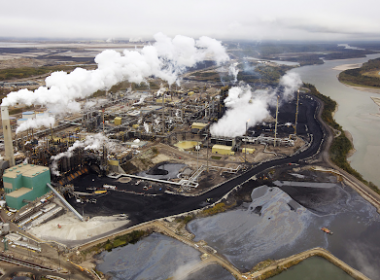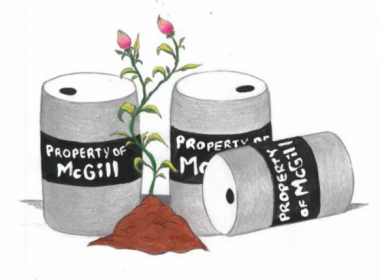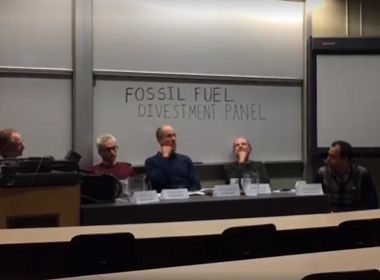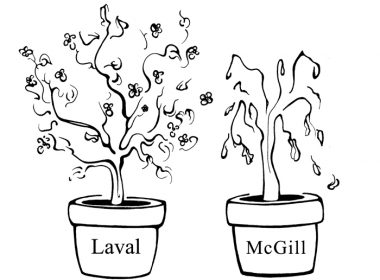Following 12 years of mobilization from students and faculty, the Board of Governors (BoG) voted on Dec. 14 to divest from all direct holdings in Carbon Underground (CU) 200 fossil fuel companies. This is a significant step toward greater environmental justice and a well-deserved victory for Divest McGill, an organization[Read More…]
Tag: Fossil fuels
McGill divests direct holdings from Carbon Underground 200 fossil fuel companies
On Dec. 14, the McGill Board of Governors (BoG) voted to divest from all direct holdings in Carbon Underground (CU) 200 fossil fuel companies, which currently constitute 0.5 per cent of total McGill Investment Pool (MIP) holdings as of December 2022. CU 200 companies include the world’s top 200 coal,[Read More…]
Weathering the storm of aerosol emissions
There has long been concern surrounding the environmental impacts of extracting oil from Alberta’s Athabasca oil sands, the world’s third largest oil reserve. According to a McGill-led study published in Environmental Pollution, contamination from the Athabasca oil sands is impacting the weather patterns of nearby regions. The study was led[Read More…]
Energies of the future
With the current climate and energy crisis, many renewable forms of energy have been proposed and implemented, but they have yet to be realized on a scale that challenges the fossil fuel industry. While each source of renewable energy has its respective drawbacks, it remains the future for energy production. [Read More…]
What is divestment?
On Sept. 12, the McGill Senate voted to support divestment from fossil fuels. While the term ‘divestment’ is ubiquitous on McGill’s campus, its meaning and implications remain foggy to many. To maintain financial stability, the Senate reports that McGill invests part of its $1.6 billion endowment into fossil fuel firms.[Read More…]
Senate should not have to overstep to amplify student voices
On Sept. 12, McGill’s Senate passed a motion endorsing McGill’s divestment from corporations involved in the production, transportation, or sale of fossil fuels. The Senate’s decision puts pressure on the Board of Governors (BoG), which ultimately has the power to divest, but has already refused to do so twice before.[Read More…]
Tribune Explains: CAMSR
What is CAMSR? The Committee to Advise on Matters of Social Responsibility (CAMSR) is an ad hoc committee whose mandate is to advise the Board of Governors (BoG) on socially responsible investing. Final decisions on the University’s academic, business, and financial affairs rest with the BoG. For an investment to[Read More…]
McGill professors debate the effectiveness of fossil fuel divestment
“The research shows that [divestment] does make a difference,” Mikkelson said. “The most comprehensive study [of divestment movements] was done at Oxford, and they looked at other divestment campaigns that didn’t necessarily cripple the industries they were targeting, but what they did do is make a big public impact, and that spurred governments to take action [….] Divestment creates impact by raising awareness, stigmatizing target companies, and influencing legislation.”
Etzion further emphasized the status of divestment as a social rather than economic movement.
“I don’t really perceive [fossil fuel divestment] as a financial tactic,” Etzion said. “It’s about something much bigger than what you invest in, it’s actually a social movement. And the objective of this tactic is to de-legitimize an entire industry. [Universities] are very influential in how the world perceives issues, and [divestment] empowers people to envision a world that is not running on a path to destruction.”
McGill Board of Governors meeting adjourns early following Divest McGill protest
The Dec. 12 McGill Board of Governors (BoG) meeting was forced to adjourn early after members of Divest McGill staged a protest. The group, which lobbies for McGill to divest its endowment funds from fossil fuel companies, demanded that the McGill community be consulted about proposed changes to the Committee[Read More…]
Université Laval first university in Canada to divest from fossil fuels
On Feb. 15, Université Laval became the first Canadian university to commit to divest its endowment fund from fossil fuel-related companies. Fossil fuel investments made up an estimated five to 15 per cent of the university’s total endowment—equivalent to $11 to 30 million—according to Alice-Ann Simard, founder of ULaval sans fossiles[Read More…]















